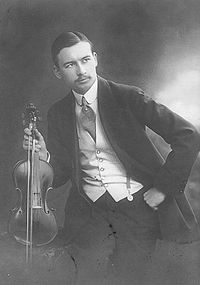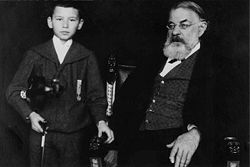
Franz von Vecsey
Encyclopedia

Violin
The violin is a string instrument, usually with four strings tuned in perfect fifths. It is the smallest, highest-pitched member of the violin family of string instruments, which includes the viola and cello....
ist and composer
Composer
A composer is a person who creates music, either by musical notation or oral tradition, for interpretation and performance, or through direct manipulation of sonic material through electronic media...
.
He was born in Budapest
Budapest
Budapest is the capital of Hungary. As the largest city of Hungary, it is the country's principal political, cultural, commercial, industrial, and transportation centre. In 2011, Budapest had 1,733,685 inhabitants, down from its 1989 peak of 2,113,645 due to suburbanization. The Budapest Commuter...
and began his violin studies with his father, Lajos Vecsey, and at the age of eight he entered the studio of Jenő Hubay
Jeno Hubay
Eugen Huber , better known by his Hungarian name Jenő Hubay , was a Hungarian violinist, composer and music teacher.-Early life:Eugen Huber was born into a German family of musicians in Pest, Hungary...
. Two years later, aged ten, he played for Joseph Joachim
Joseph Joachim
Joseph Joachim was a Hungarian violinist, conductor, composer and teacher. A close collaborator of Johannes Brahms, he is widely regarded as one of the most significant violinists of the 19th century.-Origins:...
in Berlin
Berlin
Berlin is the capital city of Germany and is one of the 16 states of Germany. With a population of 3.45 million people, Berlin is Germany's largest city. It is the second most populous city proper and the seventh most populous urban area in the European Union...
and subsequently became known as a stellar child prodigy virtuoso.
He became one of the pre-eminent violinists in Europe in the 1910s and '20s, at one point touring with Béla Bartók
Béla Bartók
Béla Viktor János Bartók was a Hungarian composer and pianist. He is considered one of the most important composers of the 20th century and is regarded, along with Liszt, as Hungary's greatest composer...
as his piano accompanist. Aged only 12, he became the re-dedicatee of Jean Sibelius
Jean Sibelius
Jean Sibelius was a Finnish composer of the later Romantic period whose music played an important role in the formation of the Finnish national identity. His mastery of the orchestra has been described as "prodigious."...
's Violin Concerto in D minor
Violin Concerto (Sibelius)
The Violin Concerto in D minor, Op. 47, was written by Jean Sibelius in 1904.-History:Sibelius originally dedicated the concerto to the noted violinist Willy Burmester, who promised to play the concerto in Berlin...
in 1905, after the original dedicatee, Willy Burmester
Willy Burmester
Willy Burmester was a German violinist.Burmester was born in Hamburg and was a pupil of Joseph Joachim, with whom he studied for many years in Berlin...
, refused to play the work after he was unable to appear at the premiere of the revised version and it was premiered by Karel Halíř
Karel Halír
Karel Halíř was a Czech violinist who lived mainly in Germany...
instead. Vecsey championed the Sibelius concerto, first performing at when he was only 13, although he could not adequately cope with the extraordinary technical demands of the work. He was also the dedicatee of Hubay's Violin Concerto No. 3. He also spent time composing, and wrote a number of virtuosic salon pieces for the violin.
His career faltered somewhat after the First World War
World War I
World War I , which was predominantly called the World War or the Great War from its occurrence until 1939, and the First World War or World War I thereafter, was a major war centred in Europe that began on 28 July 1914 and lasted until 11 November 1918...
, as he grew tired of the constant touring involved in the life of a concert artist. He hoped to take up conducting. However, in 1935, he became seriously ill with pulmonary embolism
Pulmonary embolism
Pulmonary embolism is a blockage of the main artery of the lung or one of its branches by a substance that has travelled from elsewhere in the body through the bloodstream . Usually this is due to embolism of a thrombus from the deep veins in the legs, a process termed venous thromboembolism...
that grew through much of his life. He sought medical care in Rome
Rome
Rome is the capital of Italy and the country's largest and most populated city and comune, with over 2.7 million residents in . The city is located in the central-western portion of the Italian Peninsula, on the Tiber River within the Lazio region of Italy.Rome's history spans two and a half...
. However, the operation was unsuccessful, and he died at the age of 42.
Selected compositions
Violin Solo- Preludio e Fuga in C minor (1914)
Violin and Piano
- À toi (1921)
- La Campanella (1934); transcription based on the Rondo from Violin Concerto No. 2Violin Concerto No. 2 (Paganini)The Violin Concerto No. 2 in B minor, Op. 7, was composed by Niccolò Paganini in Italy in 1826. In his Second Concerto, Paganini holds back on the demonstration of virtuosity in favour of greater individuality in the melodic style...
by Niccolò PaganiniNiccolò PaganiniNiccolò Paganini was an Italian violinist, violist, guitarist, and composer. He was one of the most celebrated violin virtuosi of his time, and left his mark as one of the pillars of modern violin technique... - Caprice in F major (1913)
- Caprice fantastique (1933)
- Caprice No. 1 "Le Vent" in A minor (1916)

- Caprice No. 2 "Cascade" in F major
- Caprice No. 3 "Valse macabre"
- Caprice No. 4 "Badinage"
- Caprice No. 5 "La Lune glisse à travers les nuages" (1917)
- Caprice No. 6 "Octaves dansantes"
- Caprice No. 7 "Claire de lune"
- Caprice No. 8 "Feu d'étincelles"
- Caprice No. 9 "Reflets dans l'eau"
- Caprice No. 10 "Pensée fantastique"
- Le Chagrin de Pierrot
- Chanson nostalgique (1933)
- Chanson triste (1913)
- Conte passionné in G major (1913)
- Devant un tombeau (1921)
- Mariä Wiegenlied (1934); transcription of Max RegerMax RegerJohann Baptist Joseph Maximilian Reger was a German composer, conductor, pianist, organist, and academic teacher.-Life:...
's Op. 76, No. 52 - Motus Barbarus
- Nuit du Nord (1921)
- Plainte nostalgique
- Preghiera in G minor (1924)
- Préludes for 2 Violins and Piano (1921)
-
- No. 3 – Badinage impertinant
- No. 4 – Claire de lune sur le Bosphore
- No. 5 – Pourquoi ...
- Souvenir (1913)
- Trois Morceaux (1912)
- No. 1 – Rêve (A minor)
- No. 2 – Humoresque (E minor)
- No. 3 – Minuet (E major)
- Valse lente (1933)
- Valse triste in C minor (1913)

